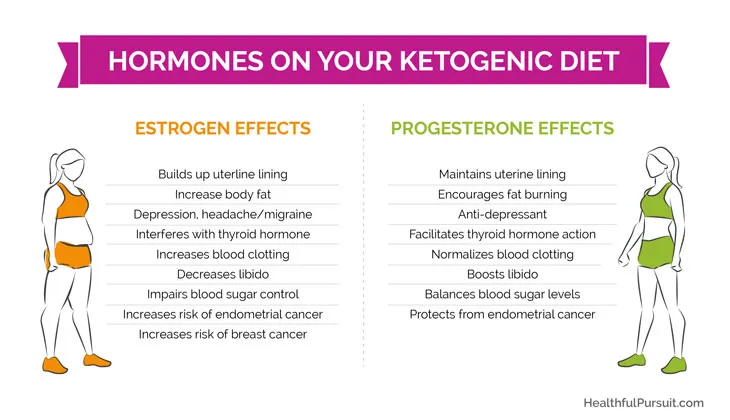Keto and Hormones: Understanding the Connection for Better Health
Introduction
The ketogenic diet, commonly known as keto, has gained immense popularity in recent years for its potential health benefits, including weight loss, improved energy levels, and better blood sugar control. But did you know that keto can also have a significant impact on your hormones? In this article, we will explore the connection between keto and hormones, and how understanding this relationship can help you achieve better overall health.
What is the ketogenic diet?
The ketogenic diet is a high-fat, low-carbohydrate eating plan that has been used for decades to treat epilepsy in children. The diet works by forcing the body to use fat for fuel instead of carbohydrates, which leads to the production of ketones, a type of molecule that the body can use for energy.
In a typical Western diet, the body relies on carbohydrates for energy, which are broken down into glucose in the bloodstream. When carbohydrates are restricted, the body enters a state of ketosis, where it begins to burn fat for fuel instead. This shift in metabolism can have a number of positive effects on the body, including weight loss, improved insulin sensitivity, and increased energy levels.
How Does Keto Affect Hormones?
The ketogenic diet can have a significant impact on hormone levels in the body. One of the key hormones affected by keto is insulin, which is a hormone that regulates blood sugar levels. When carbohydrates are restricted on the keto diet, insulin levels tend to decrease, which can help improve insulin sensitivity and blood sugar control.
Another hormone that is affected by keto is leptin, which is a hormone that regulates hunger and metabolism. Studies have shown that the ketogenic diet can lead to decreased levels of leptin, which may help reduce appetite and promote weight loss.
Additionally, the ketogenic diet can also have an impact on other hormones, such as cortisol, thyroid hormones, and sex hormones. Some studies have suggested that keto may help reduce levels of cortisol, a stress hormone that can contribute to weight gain and other health issues. Keto may also have a positive effect on thyroid hormones, which play a key role in metabolism and energy levels.
Overall, the ketogenic diet can have a complex and wide-ranging impact on hormone levels in the body, which can have a significant impact on overall health and well-being.
Benefits of Keto on Hormones
There are a number of potential benefits of the ketogenic diet on hormone levels in the body. Some of the key benefits include:
– Improved insulin sensitivity: By reducing carbohydrate intake, the ketogenic diet can help improve insulin sensitivity, which can help regulate blood sugar levels and reduce the risk of type 2 diabetes.
– weight loss: The ketogenic diet is known for its ability to promote weight loss, which can have a positive impact on hormone levels in the body.
– Reduced inflammation: The ketogenic diet has been shown to have anti-inflammatory effects, which can help reduce levels of inflammatory hormones in the body.
– Increased energy levels: By using fat for fuel instead of carbohydrates, the ketogenic diet can help stabilize energy levels throughout the day.
– Better mood and mental health: Some studies have suggested that the ketogenic diet may have a positive impact on mood and mental health, possibly due to its effects on hormone levels in the body.
Overall, the ketogenic diet can have a number of potential benefits on hormone levels in the body, which can have a significant impact on overall health and well-being.
FAQs
1. Is the ketogenic diet safe for everyone?
While the ketogenic diet can be safe for most people, it may not be suitable for everyone. It is always best to consult with a healthcare provider before starting any new diet or weight loss plan, especially if you have any underlying health conditions or concerns.
2. Can the ketogenic diet affect hormone levels in women?
Yes, the ketogenic diet can affect hormone levels in women, just as it can in men. Some women may experience changes in menstrual cycles, hormone levels, or fertility when following a ketogenic diet. It is important to listen to your body and consult with a healthcare provider if you have any concerns.
3. How long does it take to see changes in hormone levels on the ketogenic diet?
The timeline for seeing changes in hormone levels on the ketogenic diet can vary from person to person. Some people may notice changes within a few weeks of starting the diet, while others may take longer to see significant changes. It is important to be patient and consistent with the diet to see the best results.
4. Are there any potential side effects of the ketogenic diet on hormone levels?
While the ketogenic diet can have many benefits on hormone levels, some people may experience side effects, such as changes in mood, energy levels, or menstrual cycles. It is important to listen to your body and consult with a healthcare provider if you have any concerns.
Conclusion
The ketogenic diet can have a significant impact on hormone levels in the body, which can have a wide range of effects on overall health and well-being. By understanding the connection between keto and hormones, you can make informed choices about your diet and lifestyle to achieve better health.
If you are considering trying the ketogenic diet, it is important to consult with a healthcare provider to ensure that it is safe and appropriate for you. With the right guidance and support, the ketogenic diet can be a powerful tool for improving hormone levels, weight loss, and overall health.
Remember to listen to your body, be patient, and stay consistent with the diet to see the best results. By taking care of your hormones through proper nutrition and lifestyle choices, you can achieve better health and well-being for years to come.

